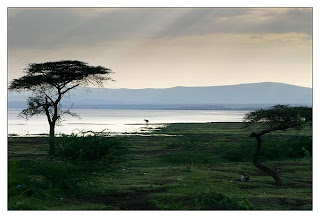About 4:00 p.m.
Sitting at the Kim Cafe. Painted lilac, which matches the blossoms of the jacaranda trees across the way.
Young men walk by with their plastic bags of chat leaves.
It just finished raining and the air is slightly chilly.
A guy tries to engage me in his alleged campaign against FGM; wants me to come to his house so he can show me his "documentation." And then hopes I will give him money for his campaign.
Later ... scenes from my balcony
A crazy man rotates in place several times, stands still for a moment, and then walks off in the direction in which he stopped.

Immense baskets - about 3 feet across, resting on tops of wheelbarrows, filled with freshly baked baguettes and rolls.
Onions, tomatoes, garlic, chat, peppers, bananas, avocados, mangoes, chat, samosas, doughnuts, limes, chat, potatoes ...
A kite (type of eagle) sails above the market today.
Blue tuk-tuks up and down, up and down, up and down the road.
Two men carry blue water barrels, then load them atop a minibus roof, already crowded with yellow plastic water jugs.
No scarf, shawl, or dress is the same in Harar -- plaids, florals, stripes, embroidered, plain. Gold on black, yellow on blue, butterscotch, black and yellow squares interspersed on a dull orange, pinks and greens -- bright green, pale green, dark green, teal.
Tin roofs. Satellite dishes (probably contraband from Sudan).
 |
| View to right of Hotel Belayneh balcony. Photo credit: Kokoryko |
A medieval agrarian kingdom off to my right -- great if you're royalty, but mostly populated by peasants.
Dogs slip through and around the market, quietly, alert for a tidbit and watching out for gratuitous kicks and stones issued by passersby.
A truck attempting the polished stone road can't get a grip on the wet and slippery rocks and slips and slides before it gains purchase.
A young boy, maybe seven, gestures and speaks to himself. Maybe an imaginary friend? Autistic? OCD?
Morning
I found my way back to the traditional guest house where Ed was staying, then he, Aziz, and I set out on our walking tour. To tell the truth, kind of a bore, with the exception of an almost-fight between Aziz and the guy who wanted to show me his grandmother's souvenir shop on Saturday. Aziz pronounced this guy crazy (a designation one hears frequently in this town). Guide competition is fierce in Harar, and I think the other guy believed (mistakenly) that he had some claim as my guide.
Unfortunately, the guides in Harar evidently have zero training on being a guide, even if they can produce a card designating them as such. In my view, there is no value in hiring any of these guides; one is just fine buying a Harar map in any of the museums for 30 birr -- at least until the so-called guides learn something of the art.
We ended our tour at the cafe next to a church in the main square. There, met a German woman, Imma, who fell in love with Harar and is renting a house within the walled city for a month. She has been helping a woman care for her baby and toddler, believing, nevertheless, the infant will die soon after she returns to Germany.
The mother devotes her life to chewing chat. Chat reduces the appetite, and the mother is poor to begin with, and the infant may not be receiving enough nutrients from the mother's breast milk. Mother and children live on a section of sidewalk in front of a store.
Also met another guide; he's been suffering from hepatitis, but evidently took some traditional medicine and believes himself cured.
An American man walked into the cafe, sat down, and made note of having been able to "file his story;" he pulled out a spiral notebook and began writing. I'd have had no compunction about introducing myself, but I was hot and tired, and in the moment, couldn't muster sufficient interest to stir myself.
In the evening, Americans Ed, Tom, and I (and later, Irish Edith and the Dutch couple) gathered by plan or accident in the Hotel Belayneh Restaurant. I'd heard from various travelers about the pleasure of visiting Iran, and was dismayed to learn from Ed that Americans can't go there the way other nationals can. Evidently, we can only go as part of a guided tour. Well.
In talking about an alternative to Iran - a place with similar pleasant qualities, such as culture, scenery, friendliness of people - the consensus among the other Americans, the Dutch, and the Irish was that Syria was the place to go.
Edith and the Dutch couple went to the Babile camel market today and waxed poetic about it. It operates on Mondays and Thursdays. So - maybe I'll stay til Friday so I can check out the Thursday market.





















































